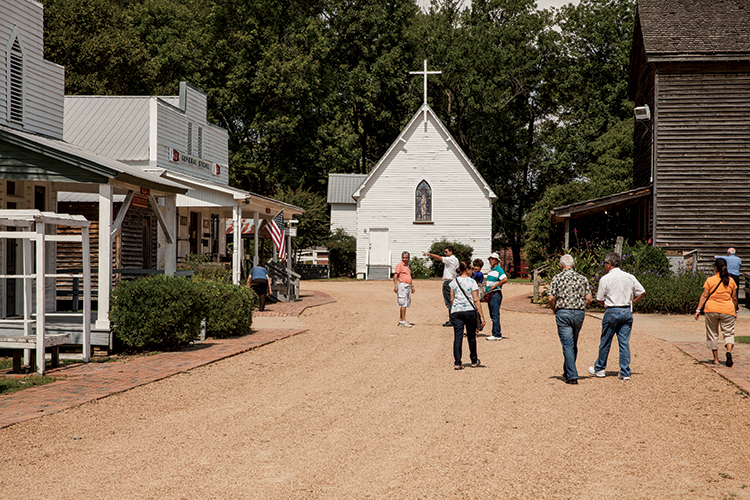Home > Mississippi > Mississippi Agritourism > Small Town Mississippi
Small Town Mississippi
In partnership with: Mississippi Department of Agriculture and Commerce

Small Town, Mississippi, is a life-sized replica of a 1920s crossroads town. The buildings were moved to the Mississippi Ag and Forestry Museum grounds from various locations throughout the state.
“It preserves a way of life that doesn’t exist anymore,” says Lise Foy, the museum’s executive director. “It makes people remember things and tell stories about memories they have.”
Attractions in the Small Town, Mississippi, exhibit include:
TBZH Print Shop – The print shop is a composite of all small-town print shops that operated in Mississippi in the early 1900s.
Blacksmith shop – The blacksmith shop was a necessity in small towns in the early 20th century, providing many vital services for the community, including repairing wagon wheels and farm tools, sharpening plow points, and shoeing horses.
Doctor’s office – Dr. John Whitworth Melvin originally used the office in 1905 when it was built. Doctors’ offices at that time were only equipped to perform family medicine, deliveries and minor surgery.
General store – The general store features authentic artifacts as well as items for purchase, including souvenirs, toys, Mississippi-made foods and products, books, and snacks.
Church – The last services hosted in the Epiphany Episcopal Church were in 1892. When the church was donated to the museum in 1984, it was disassembled, moved and reconstructed.
Schoolhouse – Small Town School replicates typical schools throughout Mississippi in the 1920s when several grades were taught in the same room.
Masonic lodge – Museum Lodge No. 636 was designed after Woodland Lodge No. 542 in Woodland. Lodges were a vital part of life in small towns with the first floor being used as a voting precinct, schoolhouse and community meeting place.
Filling station – Providing fuel for automobiles and tractors, these stations were a small town staple.
Bisland Cotton Gin – Built in 1892, this is the oldest working cotton gin in the country and was originally located in Cannonsburg, Miss.
Saw mill – Moved from Jefferson County, it contains a circular saw that is run by a diesel motor.
Cane mill – After sugarcane was harvested, it was processed in a cane mill producing molasses.
To learn more about Small Town, Mississippi, visit MSagmuseum.org.



